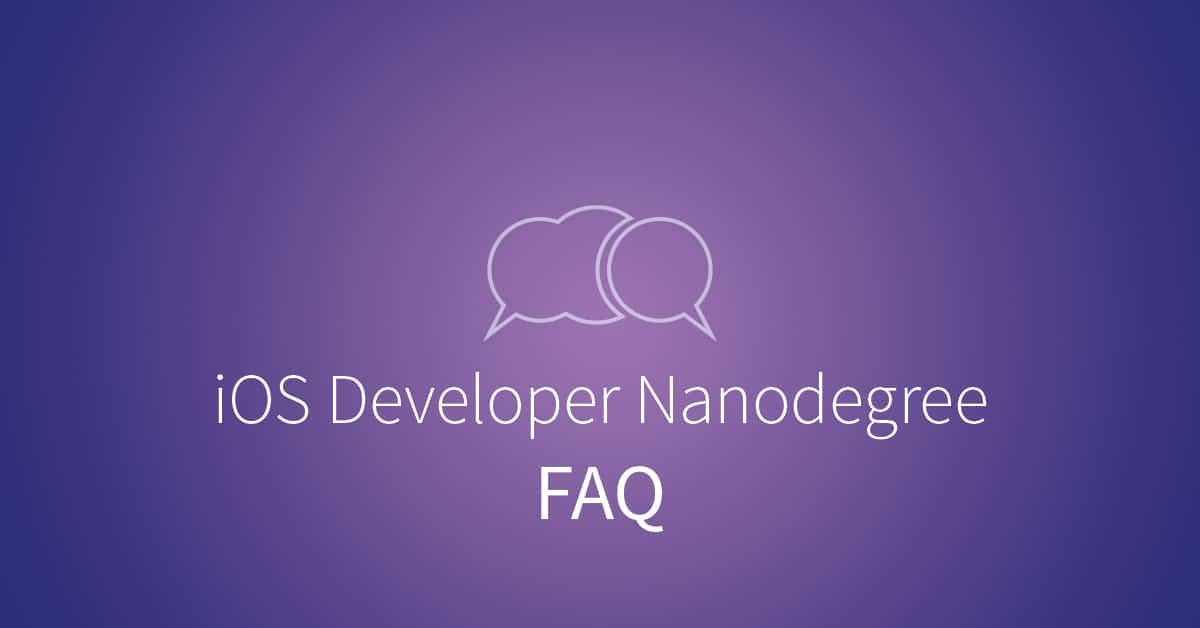Enrollment for the inaugural cohort of the iOS Developer Nanodegree opens today! We’re incredibly excited to be welcoming these first students, and hope you’ll be one of them.
However, enrolling in the Nanodegree curriculum is a commitment, and we want you to help you decide whether or not this program is for you. Last week, we held a brief info session with Jason Schatz (iOS Curriculum Manager) and Miriam Swords-Kalk (Nanodegree Community Manager) to answer your most commonly asked questions about the program.
Will the Nanodegree program use Objective-C or Swift?
This is, by far, our most-asked question. The answer? You’re going to learn Swift. Here’s why.
Do I have to have the latest and greatest hardware to be successful?
Short answer: no. Heck, I’ve got a six-year-old Macbook Pro at home that chugs along just fine. The only requirement is that your computer runs OS X 10.9 or later. However, your life might be a little easier if your computer has at least 8 GB RAM, but it’s not required. Having less means your computer may just run a little slow if you’re running the simulator to test different layouts.
You also don’t even need an iPhone or iPad to complete the Nanodegree; all of the apps can be developed and tested using only the simulator built into Xcode. However, having a device is a great way to thoroughly test your app, and it’s fun to see your work on an actual device.
How legitimate will this program be in the eyes of recruiters?
In truth, you’re the first cohort, so we don’t have any successful job placement numbers to share with you. What we can tell you, however, is that we spent hours scouring job descriptions and interviewing hiring managers to identify the key skills they look for in iOS Developers.
The result is a curriculum specifically designed to meet the needs of the job market, with portfolio projects that give you key technical talking points in any interview. We’re confident that if you want it, completing these portfolio projects will land you a job as an entry-level iOS Developer.
For students new to programming you recommend the Introduction to Programming Nanodegree. Why do I need to learn Python when this Nanodegree uses Swift?
You don’t need to learn Python. But the prerequisites for the iOS Developer Nanodegree ask that you have experience programming in some object-oriented programming language. If you don’t have object-oriented experience then we recommend taking Lesson 1 of Intro to Computer Science and all of Programming Foundations with Python to meet this requirement. The newly released Intro to Programming Nanodegree would also fit the bill.
We designed this Nanodegree to get you the skills necessary to land a job as an entry-level iOS Developer. This is an ambitious goal for students without OOP experience. We think that it is best to approach it in two steps: first learn the fundamentals of programming, and then wade into the details of the iOS platform.
When will all courses be available?
Our target is by the end of April. iOS Networking with Swift and iOS Core Data and Persistence will be complete by the end of March, but you can get started with the first two lessons in each of those courses today.
What if I already completed the Pitch Perfect app?
Intro to iOS App Development with Swift was released back in December, and some of you may have already taken the course and completed the project. Will you need to take the course again?
No repeats necessary. If you’ve completed Intro to iOS App Development with Swift and earned a certificate, you’ll be able to move straight on to the second project. However, if you’ve never submitted the Pitch Perfect app for grading, you’ll first need to submit your app for evaluation before moving on to the second project.
Will other cohorts open later if I can’t join in March?
Of course! Cohorts open the first Wednesday of every month, so the next cohort opens on April 1.
Can I complete the program faster than six months?
Absolutely! Our estimates assume students are spending 10 hours a week on the material, watching every lecture video, and spending a generous amount of time on projects. Spoiler alert: the easiest way to finish the program faster is to work more hours per week.
How flexible is the cohort pacing? What if I go on vacation?
Project deadlines are generously scheduled to ensure that every student, as long as they’re committing 10 hours a week, can complete them on time. As long as you’re meeting the deadlines, you’ll remain in your cohort. However, it will be your responsibility to plan accordingly for any time off, whether this means working ahead before you leave, or catching up when you get back.
What’s the nature of tutoring, can I get 1-1 support?
If you get stuck on a project, you can find immediate help from your fellow students, tutors, and instructors in the forums or group chat. However, you’re also able to schedule 1-1 sessions with a Udacity coach by requesting a time on their calendars.
Will we look at anything from WatchKit?
It’s not currently planned in the core curriculum, however, that’s not to say we won’t add material later!
So there you have it, answers to the most popular questions about our iOS Developer Nanodegree. For more details, you can watch a recording of the session here. We hope this information helps you decide whether or not this program is right for you. We hope it is, and look forward to seeing you in class!







